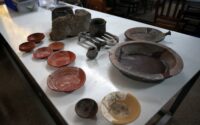 Archaeologists have unearthed an iron axe and machete dating to the Byzantine era in the ancient city of Assos in northwestern Turkey. The team found the tools while excavating the remains of dwellings which contained numerous daily use items like pottery and a small iron grill.
Archaeologists have unearthed an iron axe and machete dating to the Byzantine era in the ancient city of Assos in northwestern Turkey. The team found the tools while excavating the remains of dwellings which contained numerous daily use items like pottery and a small iron grill.
Excavation leader Professor Nurettin Arslan:
“One of the iron objects we found this year is a large iron knife, which we believe is a machete. It was found in Byzantine structures that we call the gymnasium (the training ground for athletes). The second one is an ax-type material that assumingly was used specifically for shaping and chopping wood. Both tools are quite important in terms of preserving their form well despite the long years that they have spent underground. They constitute an important example for the materials used in production in Assos.”
The axe and machete are largely intact, missing only organic parts like the handles. They stand out from the other objects recovered from the Byzantine layers as they are mostly pottery and found in fragments that the archaeologists have to piece together. The pots were used for cooking food — boiling grains and legumes, for example — as well as for serving it and storing it.
 Founded on a hill overlooking the Aegean by colonists from the island of Lesbos around 1000 B.C., Assos had the only good natural harbour in 50 miles, so it was crucial to trade in the southern Biga Peninsula for thousands of years. It has been continuously populated since its founding. The name of the modern village is Behramkale, but Assos is still referred to by its ancient name in common parlance, and is a popular seaside resort town thanks to its picturesque Aegean location and extensive surviving ancient remains, which include a spectacular 6th century B.C. Doric temple of Athena on the crag overlooking the sea, the Hellenistic-era (6th-4th century B.C.) defensive walls and the dock which is still in use today.
Founded on a hill overlooking the Aegean by colonists from the island of Lesbos around 1000 B.C., Assos had the only good natural harbour in 50 miles, so it was crucial to trade in the southern Biga Peninsula for thousands of years. It has been continuously populated since its founding. The name of the modern village is Behramkale, but Assos is still referred to by its ancient name in common parlance, and is a popular seaside resort town thanks to its picturesque Aegean location and extensive surviving ancient remains, which include a spectacular 6th century B.C. Doric temple of Athena on the crag overlooking the sea, the Hellenistic-era (6th-4th century B.C.) defensive walls and the dock which is still in use today.
Its most famous resident was Aristotle who founded his first school of philosophy there in 348 B.C. after departing Athens and the Academy in the wake of Plato’s death. He lived there three years, a valued advisor of King Hermias and soon his son-in-law when he married the king’s daughter Pythias.
A quick word about Hermias who was a remarkable individual. He first appears on the historical record as a slave to a banker named Eubulus who became ruler of Assos and Atarneus when the Persian aristocrat who owned them used them as collateral for a loan and then defaulted. Hermias was a valued member of the household and as a youth was educated at Plato’s Academy which is where he first met and become fast friends with Aristotle. Eubulus died shortly after Hermias’ return to Atarneus, leaving Hermias as his successor.
Philip II of Macedon saw an opportunity in the new despot of Assos and Atarneus. He wanted an alliance with Hermias to get access to that invaluable port for a future invasion of Asia Minor and Persia, so he dispatched Aristotle to grease the skids with Hermias. It worked. Hermias and Philip formed a diplomatic and military alliance.
The alliance did not work to Hermias’ advantage in the end. Indeed, it led directly to his agonizing death. When Artaxerxes III of Persia began eyeing an invasion of Asia Minor to reclaim lost territories, the Greeks got nervous. Athens told Philip that if he even looked at Asia Minor funny, they’d join the Persians against him. Philip decided discretion was the better part of valour and withdrew his military support, abandoning Hermias to his fate.
Artaxerxes hired the Greek mercenary general Mentor to capture Hermias. Aristotle, horrified that Philip had abandoned his friend, frantically wrote to Mentor hoping to get him to switch sides. His arguments fell on deaf ears. Hermias was imprisoned and sent to Susa where he was tortured to extract information about Philip’s invasion plans. Hermias, who definitely had the goods on Philip, refused to talk. He was loyal to the end, even to the disloyal Philip, and died in 341 B.C. His last words were “tell my friends that I have done nothing shameful or unworthy of philosophy.”
Aristotle felt the loss keenly. He dedicated a memorial monument at Delphi to Hermias and wrote a hymn honoring his steadfastness in the face of betrayal.
And now for you Atarneus’ pride,
Trusting in others’ faith, has nobly died;
But yet his name
Shall never die, the Muses’ holy train
Shall bear him to the skies with deathless fame,
Honouring Zeus, the hospitable god,
And honest hearts, proved friendship’s blest abode.
